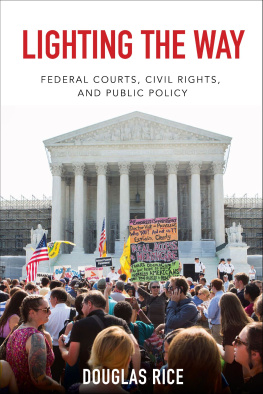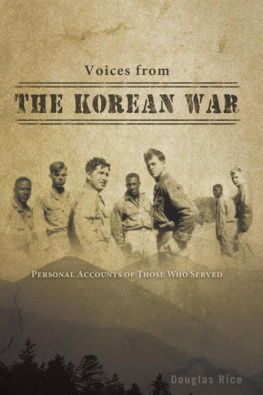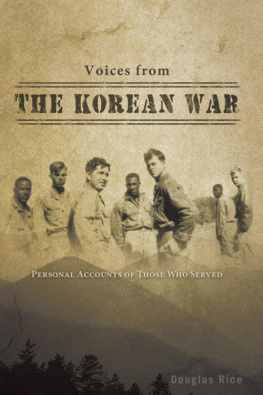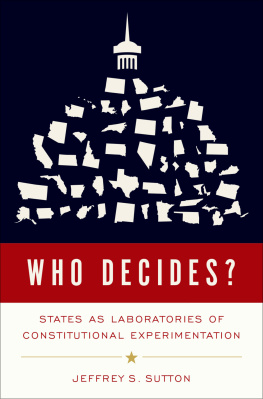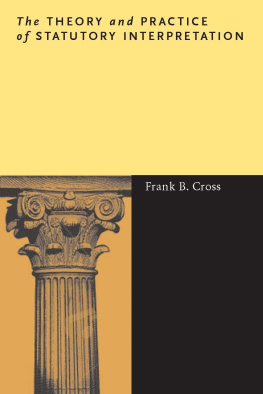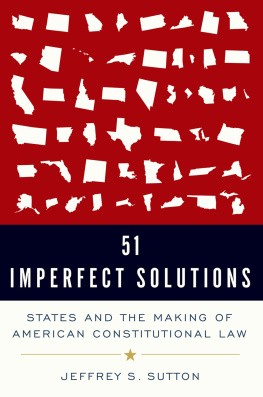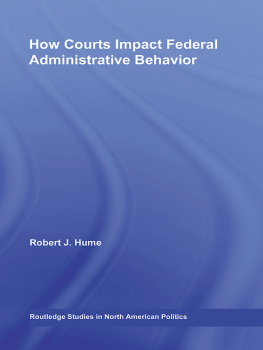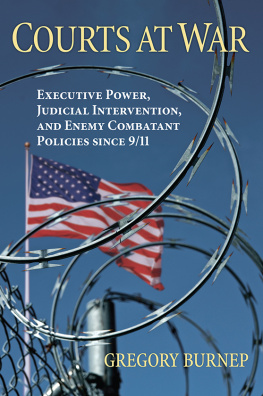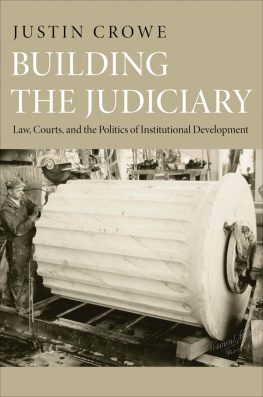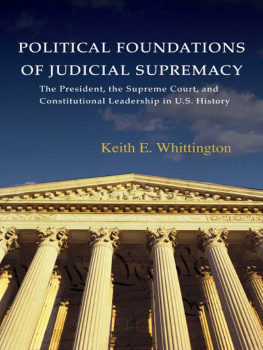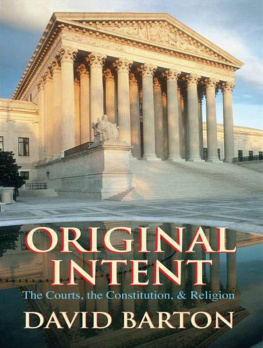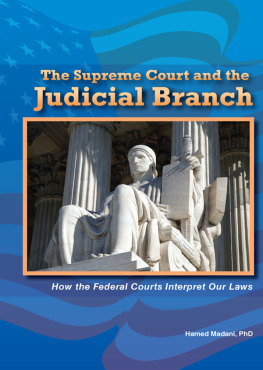University of Virginia Press
2020 by the Rector and Visitors of the University of Virginia
All rights reserved
First published 2020
Library of Congress Cataloging-in-Publication Data
Names: Rice, Douglas, 1983 author.
Title: Lighting the way: federal courts, civil rights, and public policy / Douglas Rice.
Description: Charlottesville : University of Virginia Press, 2020. | Series: Constitutionalism and democracy | Includes bibliographical references and index.
Identifiers: LCCN 2019036834 (print) | LCCN 2019036835 (ebook) | ISBN 9780813943947 (hardcover) | ISBN 9780813943954 (epub)
Subjects: LCSH: CourtsUnited States. | United States. Supreme Court. | Justice, Administration ofUnited States. | Civil rightsUnited States. | Public policy (Law)United States.
Classification: LCC KF8700 .R53 2020 (print) | LCC KF8700 (ebook) | DDC 347.73/2dc23
LC record available at https://lccn.loc.gov/2019036834
LC ebook record available at https://lccn.loc.gov/2019036835
Cover art: Krisoffer Tripplaar/Alamy Stock Photo
The research presented in this book took many years to complete, following me across three institutional homes and many more life events. Throughout, I have had the privilege of the advice, friendship, and guidance of innumerable individuals. The completion of this work is in no small part a tribute to their contributions to my growth as a person and as a scholar.
It was my great fortune to attend Penn State University for my graduate degree. I find it hard to believe that a more supportive and collegial department than that of Penn State may exist. The sparks for this project were set in my very first semester there, when I was assigned to be a research assistant for a Supreme Court project under the supervision of Chris Zorn. Chris would go on to be my adviser throughout graduate school, and he has selflessly and endlessly given of his time to help guide me through the academic experience ever since. His insightful guidance, support, and friendship have had a profound influence on my professional and personal development. I can never repay all the help he has provided, but I owe him my deepest gratitude.
I cannot thank the members of the Political Science Department enough for their help, and perhaps more frequently their patience, during my time at Penn State. I owe particular thanks to Marie Hojnacki, whose incisive comments and attention to detail vastly improved the quality of my work and whose mentoring contributed greatly to my professional development. Likewise, through countless conversations, Burt Monroe has been a profound influence on the direction I have taken as a scholar. Burt has given of his decidedly sparse time to help guide me through a host of considerations as I learned to treat text as data. More important, Burt was everywhere throughout my time in graduate schoolno matter how insignificant the event may have beento provide thoughtful comments and suggestions on my research. I thank him for all his help along the way, and for teaching me the importance of showing up. I am also very grateful to many other present and past faculty at Penn State, including James Honaker, Michael Berkman, Zach Baumann, Doug Lemke, Jeffery Ulmer, Bumba Mukherjee, Adam Nye, Eric Plutzer, Phil Schrodt, Lee Ann Banaszak, and Zaryab Iqbal.
I had the great fortune of sharing the experience of graduate school with a collection of intelligent and fun fellow graduate students. Through their friendship, support, and insightful comments on my research, these colleagues have made me a better scholar. I am particularly indebted to Ben Bagozzi, Andrew Boutton, Vito DOrazio, Steven Landis, Kathleen Marchetti, Jonathan Moody, and Eitan Tzelgov.
I would also like to thank the National Science Foundation, the College of the Liberal Arts at Penn State University, and the Quantitative Social Science Initiative at Penn State for the financial and research support they have provided for my work. This support ensured that the research was completed in a timely manner, and vastly improved the quality of the work. After leaving Penn State, I greatly benefited from my delightful colleagues at the University of Mississippi, who provided a perfect and supportive environment for me as I started out as an assistant professor and developed this book. My sincere gratitude goes to John Bruce, Conor Dowling, Chuck Smith, Heather Ondercin, Jon Winburn, Bob Brown, and John Winkle for their help and guidance as I set about this process, and to them and the many other great members of the University of Mississippis Department of Political Science for being such fantastic colleagues and friends. Finally, I have benefited enormously from the support of my colleagues at the University of MassachusettsAmherst. Paul Collins deserves particular recognition, as he has been an exceptional colleague and mentor. It is to my great benefit that I need merely walk down the hall to get his insights or opinions, and I thank him for all his help along the way.
I am very fortunate to have been able to work with the team at the University of Virginia Press. I thank Dick Holway for his patience and support. I also thank Helen Chandler for her attention to detail and guidance throughout the process. Finally, to the anonymous reviewers, I owe you tremendously. The constructive recommendations have vastly improved the research in this book, and I am eternally grateful to have had such excellent referees.
Beyond the academic community, I would never have arrived at this point without a tremendous support system of friends and family. Brian Schneider deserves particular recognition, as his calm perspective settled many a brewing fiasco, and his friendship and support helped me through my time in graduate school. I have also been blessed with not one but two amazing families. Thank you to the DiFilippos for embracing me as a member of the family. Their love and support have been priceless. I owe particular gratitude to Deb and Gene, who have gone above and beyond in their support for me. Their trust and faith are more than I ever could have asked for. Thank you also to the Stokes brood, a beautiful family that has never failed to brighten my day. I also owe my sincerest thanks to my brother, Greg Rice, who has been an inspiration to me from the day I could walk. I would not have arrived at, or finished, a doctoral program and a career as a professor without his unfailing guidance. To my girls, Atley and Emryn, thanks for your patience when I just needed to finish a thought, and big thanks for all the smiles and love you bring into my life. And though it is almost certainly inappropriate, I would also like to acknowledge our family dogsour old pals Nash and Marlie and our new addition Willafor their endless love and enthusiasm, which never fails to calm me down and cheer me up.
I am especially grateful to my parents and role models, Bob and Linda Rice. I would not be where I am today without their love and support and their many sacrifices. Their strength, in the face of far too many obstacles, has been an inspiration to me throughout my life. As I age, I find myself more and more thankful for all they have done and given. I thank them from the bottom of my heart.
Finally, I am forever indebted to Laura Rice, my partner and my best friend. From the moment we joined up, she has given of herself endlessly, tolerating random late nights and even more random early mornings, predictable breakdowns, unpredictable schedules, and endless proofreading and practice presentations. She has been unceasingly gracious, optimistic, and supportive of my goals, never failing to uplift my spirit when I most needed it. Her mastery of her field, and her constant pursuit of improvement, have been an absolute inspiration to me as a person and as a scholar. Simply put, I can imagine no better person with whom to travel through all the adventures of life.

